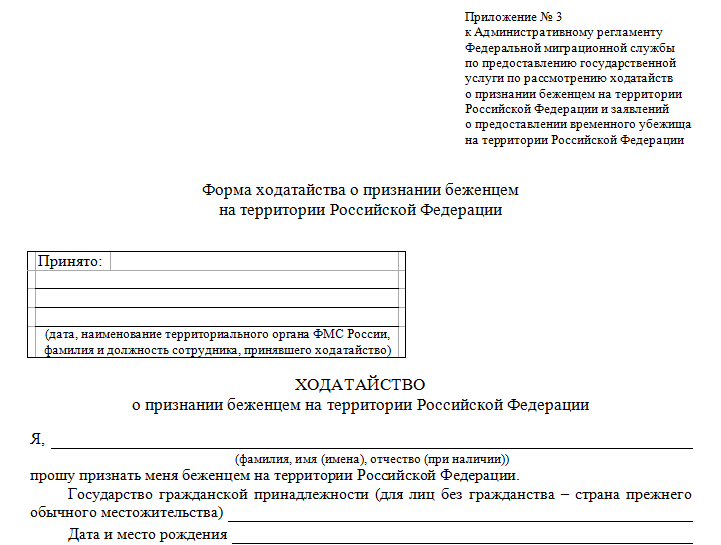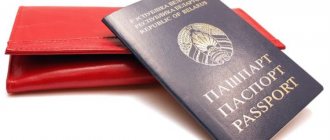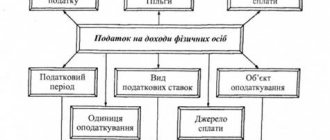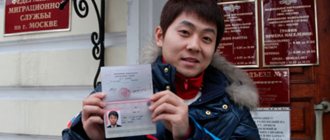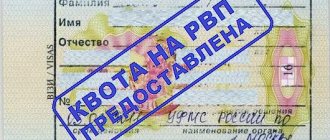| Constitutional and legal status of individuals |
| Main statuses |
| Citizenship Nationality Multiple citizenship Foreign citizenship Stateless person Permanent residence Temporary residence Temporary stay |
| Additional statuses |
| Refugee Asylum seeker Illegal migrant Migrant worker |
| Related Concepts |
| Naturalization Option Deportation Immigration Guest worker Work permit Migration law Illegal migration Visa regime |
| p • o • p |
Refugees
- persons who left the country in which they permanently resided due to emergency circumstances.
Refugee
— mass abandonment of their homes by residents due to war or natural disasters[1]
Definition
Persons who, within the meaning of the 1951 UN Geneva Convention relating to the Status of Refugees and its special Protocol[2], owing to a well-founded fear of being persecuted for reasons of race, religion, nationality, membership of a particular social group, sexual orientation or political opinion, are outside the country of their nationality and are unable or, owing to such fear, are unwilling to avail themselves of the protection of that country; or, having no nationality and being outside the country of his former habitual residence as a result of such events, is unable or unwilling to return to it owing to such fear.
In the everyday understanding of the word, refugees often also include internally displaced persons; asylum seekers (but who have not yet received refugee status); and in general all persons who were forced to move from one place to another.
Refugees are generally given equal rights to other foreigners, are documented with special travel documents, and receive preferential citizenship. In a number of countries there is a special “humanitarian status” - the so-called. temporary asylum granted in the event of a mass exodus of refugees or persons who do not meet the Convention criteria, but cannot be expelled on humanitarian grounds. Persons who have committed serious crimes of a non-political nature, including acts of terrorism, cannot be recognized as refugees. A refugee or asylum seeker cannot be sent back to their country of origin.
According to Russian law, a refugee
is a person who is not a citizen of the Russian Federation and who, due to a well-founded fear of becoming a victim of persecution on the grounds of race, religion, citizenship, nationality, membership of a particular social group or political opinion, is outside the country of his citizenship and cannot enjoy the protection of this country or is unwilling to avail itself of such protection due to such fears; or, being of no nationality and being outside the country of his former habitual residence as a result of such events, is unable or unwilling to return to it owing to such fear.[3]
The main legal instruments on the status of refugees are the 1951 Convention and the 1967 Protocol. The UN body dealing with refugee issues is the Office of the UN High Commissioner for Refugees. The [www.icrc.org International Committee of the Red Cross] is also involved in helping refugees and internally displaced persons in armed conflicts.
Since 2001, the world community has celebrated World Refugee Day on June 20.
Who is a refugee
Refugees are foreign citizens temporarily staying in a foreign country and enjoying the protection of local authorities.
They are recognized as people who were forced to leave their homeland due to the fact that they were in serious danger. However, their government did nothing to ensure the safety of its citizens. The following people are recognized as refugees in the Russian Federation:
- Persons who have been exposed to danger because of their political opinions.
- Individuals who have experienced a threat to their life because of their race or nationality.
- People who have been targeted because of their religion or membership in a social group.
At the same time, a person applying for refugee status must have a document confirming the existence of a threat to life for one of the listed reasons.
It is also necessary to confirm that an appeal was made to their government representatives, and they refused to take measures to ensure security. In this case, the person will be able to remain in the Russian Federation as long as there is a threat to life in their home country. Why is it important to obtain refugee status? Primarily due to the fact that in Russia there is a limited period of stay for tourists. People from the CIS can legally stay on its territory for up to 90 days, after which they will be forced to leave. A refugee can live peacefully in the Russian Federation for 3 years, officially work and enjoy benefits. Therefore, it will be much easier for those who have this status to settle in the country.
Refugee status also gives a person the right to:
- Receiving free medical assistance.
- Assistance in transporting luggage.
- Social protection.
- Staying in a temporary stay center where you can eat and use utilities for free.
- Official employment and salary not lower than the minimum.
To receive all the privileges that come with refugee status, you will need to submit your identity card (for example, a passport) and a migration card to the Russian migration authority. A person will not be able to return to his homeland if necessary, since the necessary document for this is missing. However, the government gives a person the right to prematurely renounce refugee status. After this, you will be able to pick up your document and leave the territory of the Russian Federation.
Story
In the Middle Ages in Europe, the right of refuge in churches was almost universally recognized. However, it only applied to criminals.
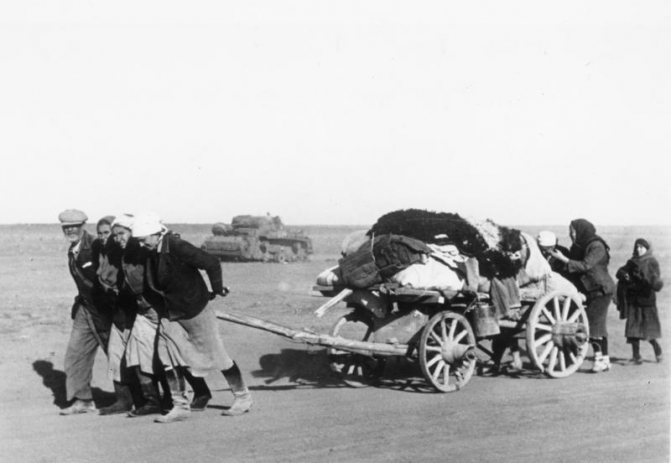
Subsequently, the concept of political asylum appeared, which was used by dissidents and revolutionaries. In international law, the concept of refugees appears after the First World War: in 1922, the League of Nations adopted the first agreement (supplemented by agreements of 1924, 1926 and 1928 on the status of Russian and Armenian refugees. For the first time, the rights of refugees were defined, they received travel documents of a special type (Nansen passport, named after polar explorer and first League of Nations High Commissioner for Refugees Fridtjof Nansen).[4][5] The agreements were subsequently extended to all refugees from Turkey and Nazi Germany.
After World War II, the International Organization for Refugees was created, transformed in 1951 into UNHCR.
| The information in this article or some sections of it is out of date. You can help the project by updating it and then removing this template. |
What is the difference between receiving temporary asylum and refugee status?
A foreign citizen can not only stay on the territory of the Russian Federation as a refugee, but also receive temporary asylum here. status and temporary asylum - what is the difference between them?
Temporary asylum can be granted to a foreigner or stateless person in two cases:
You can find more complete information on the topic in ConsultantPlus. Free trial access to the system for 2 days.
- A person has grounds for obtaining refugee status, but does not want to apply for it, but asks to be allowed to temporarily stay in Russia.
- The person has no grounds for recognition as a refugee, but due to the principles of humanity, he should not be expelled from Russia.
To obtain temporary asylum, a person who does not have Russian citizenship must contact the Federal Migration Service at his/her location.
A person who has received temporary asylum receives the right to stay in Russia until the grounds for this no longer exist. However, if such a person is brought to criminal liability for an act committed in the Russian Federation, the right to temporary asylum is lost.
Refugee status provides more significant advantages: a citizen has the legal right to live in the Russian Federation for 3 years, receive medical care, find a job, etc.
However, there is a small caveat. After the applicant has received a refugee certificate, he is obliged to deposit the migration card and identity card with the Federal Migration Service. That is, if he wants to go to his homeland, he will not be able to do so at first. But a refugee has the opportunity to renounce his status before the expiration of the 3-year period.
Thus, we can say with confidence that refugee status relative to temporary asylum in the Russian Federation provides more advantages for those who received it and allows them to live on the territory of the Russian Federation for 3 years. But more efforts must be made to obtain refugee status.
Number of refugees
2007
According to a UNHCR study, at the end of 2007, there were 11.4 million refugees and 26 million other internally displaced persons (IDPs) outside their countries due to conflict and persecution, resulting in an unprecedented number of people experiencing homelessness in the UN Agency's care for refugee affairs[6]. Most of them are concentrated in Africa (usually located in refugee camps); a significant number of asylum seekers (up to several hundred thousand annually) penetrate into Western Europe and the United States. Governments in developed countries are often accused of being too harsh in granting refugee status. Assistance in determining refugee status and assistance to refugees is provided both by the governments of the relevant countries and by UNHCR, whose budget is more than $1 billion.
year 2009
The number of refugees in the world has reached 42 million[7]
Providing temporary asylum
In accordance with the provisions of Article 12 of the Law and Decree of the Government of the Russian Federation dated 04/09/2001 No. 274 “On the provision of temporary asylum on the territory of the Russian Federation” to foreign citizens who are denied recognition as refugees in the Russian Federation and who cannot be expelled outside the Russian Federation The Federation may be granted temporary asylum for humanitarian reasons. Temporary asylum is a type of “humanitarian status” or deferred removal. To obtain temporary asylum in the Russian Federation, the applicant must submit a corresponding application to the territorial bodies of the Ministry of Internal Affairs of Russia.
Upon acceptance of the application, the person is issued a certificate of consideration of the application for temporary asylum on the territory of the Russian Federation, which gives the applicant the right to stay in the territory of the Russian Federation for the period of consideration of the application.
The application review period is up to three months. The decision on the application is made by the territorial bodies of the Ministry of Internal Affairs of Russia. If the decision is positive, a certificate of temporary asylum on the territory of the Russian Federation is issued. A negative decision can be appealed in accordance with the general procedure. Temporary asylum is granted for one year and can be renewed annually for 12 months. Under certain conditions, a person may lose or lose temporary asylum. The Russian Ministry of Internal Affairs has three Temporary Accommodation Centers for asylum seekers in the Russian Federation, with a total capacity of 180 places. Persons who have received refugee status, political or temporary asylum in the Russian Federation have access to the internal labor market - they can work without obtaining a special permit.
Indicators for Europe
| State | Number of asylum seekers in 2012 (across Europe)[8] | Percentage of total population |
| Germany | 77650 | 0,0968 |
| France | 61455 | 0,0968 |
| Sweden | 43945 | 0,4599 |
| Switzerland | 28640 | 0,3600 |
| Belgium | 28285 | 0,2563 |
| Great Britain | 28260 | 0,0447 |
| Austria | 17450 | 0,2074 |
| Italy | 17350 | 0,0291 |
| Netherlands | 13100 | 0,0780 |
| Poland | 10755 | 0,0279 |
| Norway | 9785 | 0,1932 |
| Greece | 9575 | 0,0885 |
| Denmark | 6075 | 0,1089 |
| Finland | 3115 | 0,0575 |
| Spain | 2565 | 0,0054 |
| Romania | 2510 | 0,0135 |
| Hungary | 2155 | 0,0217 |
| Malta | 2080 | 0,4596 |
| Luxembourg | 2055 | 0,3821 |
| Cyprus | 1635 | 0,1460 |
| Bulgaria | 1385 | 0,0188 |
| Ireland | 955 | 0,0208 |
| Czech | 755 | 0,007 |
| Slovakia | 730 | 0,0135 |
| Lithuania | 645 | 0,0217 |
| Slovenia | 305 | 0,0148 |
| Portugal | 295 | 0,0028 |
| Latvia | 205 | 0,0101 |
| Estonia | 75 | 0,0058 |
| Liechtenstein | 75 | 0,0058 |
Notes
- [dic.academic.ru/dic.nsf/ushakov/744546 Refugee] in Ushakov’s Explanatory Dictionary. 1935-1940.
- [www.unhcr.ru/page_basics.php?menuid=43&pageid=14 Convention and Protocol relating to the status of refugees. - Office of the High Commissioner for Refugees] (Russian), [www.unhcr.org/protect/PROTECTION/3b66c2aa10.pdf Text of the UN HCR Convention] (English)
- [www.consultant.ru/online/base/?req=doc;base=law;n=65023 FEDERAL LAW of 02/19/1993 N 4528-1 (as amended on 12/30/2006) “ON REFUGEES”]
- [his.1september.ru/2002/02/1.htm Zoya BOCHAROVA. Legal status of Russian refugees in the West in the 1920-1930s]
- [www.pglu.ru/lib/publications/University_Reading/2009/XII/uch_2009_XII_00043.pdf R. V. Lebedenko. Legal status of Russian emigration in France in the 20s]
- [www.unhcr.ru/page_news.php?menuid=306&pageid=218 The number of refugees and IDPs around the world is growing for the second year in a row]
- [news.tut.by/world/140390.html The number of refugees in the world has reached 42 million]
- “Number of asylum application by country. [appsso.eurostat.ec.europa.eu/nui/submitViewTableAction.do?dvsc=4 Eurostat]. 06/21/2013.
How to register refugee status with the Federal Migration Service?
|
So, how to apply for refugee status ?
- An interested citizen applies to one of the above authorities with a request to obtain refugee status. Information about minor family members is included in the parent’s application. If the application was submitted through a consular office or diplomatic mission, they are obliged to submit it to the Federal Migration Service within 1 month. If the application was submitted to the border control authorities, then they transfer it to the FMS authorities within 3 days.
- Within 5 working days, the FMS authorities preliminary consider the received application. After consideration, one of the following decisions is made: - The applicant is denied consideration of the application. — The applicant is issued a certificate of further consideration of the application.
- If the applicant is refused, he is notified within 3 days. If an application is submitted through a consular office or diplomatic mission, the FMS sends a decision refusing to recognize the person as a refugee within 5 days after its adoption.
- If a positive decision has been made to further consider the application, then a personal file is opened on the foreign citizen and a certificate is issued to him. After receiving this document, he has the legal right to stay on the territory of the Russian Federation.
- After a foreign citizen has received a certificate, he registers with the Federal Migration Service and then goes to the Temporary Accommodation Center. Next, he needs to undergo a medical examination and register at the place of temporary registration.
- The petition is then considered on its merits. If the person is located outside the Russian Federation, then 5 working days are given to consider the application. The FMS authorities also inform about the decision within 5 working days. If a citizen is located on the territory of the Russian Federation, then his application is considered within 3 working days, and the FMS authorities are given another 3 days to notify the decision.
- If the Federal Migration Service makes a positive decision, the citizen is issued a refugee certificate. At the same time, he is obliged to deposit his identity card and migration card with the Federal Migration Service.
Excerpt characterizing Refugees
That night Denisov celebrated his promotion to major, and Rostov, already quite drunk at the end of the feast, proposed a toast to the health of the sovereign, but “not the sovereign emperor, as they say at official dinners,” he said, “but to the health of the good sovereign, a charming and great man; We drink to his health and to a certain victory over the French!” “If we fought before,” he said, “and did not give way to the French, as at Shengraben, what will happen now that he is ahead?” We will all die, we will die with pleasure for him. So, gentlemen? Maybe I'm not saying that, I drank a lot; Yes, I feel that way, and so do you. For the health of Alexander the First! Hurray! - Hurray! – the inspired voices of the officers sounded. And old captain Kirsten shouted with enthusiasm and no less sincerely than twenty-year-old Rostov. When the officers drank and broke their glasses, Kirsten poured others and, in only a shirt and leggings, with a glass in his hand, approached the soldiers' fires and in a majestic pose, waving his hand upward, with his long gray mustache and white chest visible from behind his open shirt, stopped in the light of the fire. - Guys, for the health of the Emperor, for victory over the enemies, hurrah! - he shouted in his brave, senile, hussar baritone. The hussars crowded together and responded with a loud cry. Late at night, when everyone had left, Denisov patted his favorite Rostov on the shoulder with his short hand. “There’s no one to fall in love with on a hike, so he fell in love with Tsa’ya,” he said. “Denisov, don’t joke about this,” Rostov shouted, “this is such a high, such a wonderful feeling, such... - I feel, I feel, I share and approve...” “No, you don’t understand!” And Rostov got up and went to wander between the fires, dreaming about what happiness it would be to die without saving a life (he did not dare to dream about this), but simply to die in the eyes of the sovereign. He really was in love with the Tsar, and with the glory of Russian weapons, and with the hope of future triumph. And he was not the only one who experienced this feeling in those memorable days preceding the Battle of Austerlitz: nine-tenths of the people of the Russian army at that time were in love, although less enthusiastically, with their Tsar and with the glory of Russian weapons. The next day the sovereign stopped in Wischau. Life physician Villiers was called to him several times. News spread in the main apartment and among the nearby troops that the sovereign was unwell. He did not eat anything and slept poorly that night, as those close to him said. The reason for this ill health was the strong impression made on the sensitive soul of the sovereign by the sight of the wounded and killed. At dawn on the 17th, a French officer was escorted from the outposts to Wischau, who had arrived under a parliamentary flag, demanding a meeting with the Russian emperor. This officer was Savary. The Emperor had just fallen asleep, and therefore Savary had to wait. At noon he was admitted to the sovereign and an hour later he went with Prince Dolgorukov to the outposts of the French army. As was heard, the purpose of sending Savary was to offer a meeting between Emperor Alexander and Napoleon. A personal meeting, to the joy and pride of the entire army, was denied, and instead of the sovereign, Prince Dolgorukov, the winner at Wischau, was sent along with Savary to negotiate with Napoleon, if these negotiations, contrary to expectations, were aimed at a real desire for peace. In the evening Dolgorukov returned, went straight to the sovereign and spent a long time alone with him. On November 18 and 19, the troops made two more marches forward, and the enemy outposts retreated after short skirmishes. In the highest spheres of the army, from midday on the 19th, a strong, fussily excited movement began, which continued until the morning of the next day, November 20, on which the so memorable Battle of Austerlitz was fought. Until noon on the 19th, movement, lively conversations, running around, sending adjutants were limited to one main apartment of the emperors; in the afternoon of the same day, the movement was transmitted to Kutuzov’s main apartment and to the headquarters of the column commanders. In the evening, this movement spread through the adjutants to all ends and parts of the army, and on the night of the 19th to the 20th, the 80 thousandth mass of the allied army rose from their sleeping quarters, hummed with conversation and swayed and began to move in a huge nine-verst canvas. The concentrated movement that began in the morning in the main apartment of the emperors and gave impetus to all further movement was similar to the first movement of the middle wheel of a large tower clock. One wheel moved slowly, another turned, a third, and the wheels, blocks, and gears began to spin faster and faster, chimes began to play, figures jumped out, and the arrows began to move regularly, showing the result of the movement. As in the mechanism of a watch, so in the mechanism of military affairs, the once given movement is just as irresistible until the last result, and just as indifferently motionless, the moment before the transfer of movement, are the parts of the mechanism that have not yet been reached. The wheels whistle on the axles, clinging with teeth, the rotating blocks hiss from the speed, and the neighboring wheel is just as calm and motionless, as if it is ready to stand for hundreds of years with this motionlessness; but the moment came - he hooked the lever, and, submitting to the movement, the wheel crackled, turning and merged into one action, the result and purpose of which was incomprehensible to him. Just as in a clock the result of the complex movement of countless different wheels and blocks is only the slow and steady movement of the hand indicating the time, so the result of all the complex human movements of these 1000 Russians and French - all the passions, desires, remorse, humiliation, suffering, impulses of pride, fear , the delight of these people - there was only the loss of the Battle of Austerlitz, the so-called battle of the three emperors, that is, the slow movement of the world historical hand on the dial of human history. Prince Andrei was on duty that day and constantly with the commander-in-chief. At 6 o'clock in the evening, Kutuzov arrived at the main apartment of the emperors and, after staying with the sovereign for a short time, went to see Chief Marshal Count Tolstoy. Bolkonsky took advantage of this time to go to Dolgorukov to find out about the details of the case. Prince Andrei felt that Kutuzov was upset and dissatisfied with something, and that they were dissatisfied with him in the main apartment, and that all the persons in the imperial main apartment had the tone of people with him who knew something that others did not know; and that’s why he wanted to talk to Dolgorukov. “Well, hello, mon cher,” said Dolgorukov, who was sitting with Bilibin over tea. - Holiday for tomorrow. What's your old man? out of sorts? “I won’t say that he was out of sorts, but he seemed to want to be listened to.” - Yes, they listened to him at the military council and will listen to him when he speaks his mind; but it is impossible to hesitate and wait for something now, when Bonaparte fears more than anything else a general battle. -Have you seen him? - said Prince Andrei. - Well, what about Bonaparte? What impression did he make on you? “Yes, I saw it and was convinced that he was afraid of a general battle more than anything else in the world,” Dolgorukov repeated, apparently valuing this general conclusion he had drawn from his meeting with Napoleon. – If he were not afraid of battle, why would he demand this meeting, negotiate and, most importantly, retreat, while retreat is so contrary to his entire method of waging war? Believe me: he is afraid, afraid of a general battle, his time has come. This is what I'm telling you. - But tell me how he is, what? – Prince Andrey asked again. “He is a man in a gray frock coat, who really wanted me to say “Your Majesty” to him, but, to his chagrin, he did not receive any title from me. This is the kind of person he is, and nothing more,” answered Dolgorukov, looking back at Bilibin with a smile.
Refugee status
Refugee status is usually granted for a period of three years (although as of January 1, 2013, there is no limit on the period for which a person can be recognized as a refugee).
During this time, a person has the right to stay and work on the territory of Russia, however, at the same time, his national (for example, Ukrainian) passport is confiscated and stored in the migration service, that is, he cannot go back at first. He does not become a prisoner of Russia; documents to travel to his country or abroad can still be issued before the expiration of the “refugee passport”.
To obtain refugee status:
1. Contact the authorized body with a request for recognition as a refugee.
If a person has not yet left his country or first went not to Russia, but to another state, but wants to seek asylum in Russia, then he needs consular missions or an embassy.
If we are talking about refugees on Russian territory, you need to contact the FMS (Federal Migration Service). In the border regions, as lawyer Anna Serdyukova told Miloserdiy.ru, an application to recognize a person as a refugee is now accepted not only by the “territorial” bodies of the FMS, i.e. central institutions in regional centers, but also many others.
When officially crossing the border, refugees have to fill out a document indicating the purpose of entry. There is a column for refugees. If a person firmly plans to ask for such status, you can indicate this on the migration card and apply for status to the FSB officer at the border checkpoint. True, as today's practice shows, border checkpoints cannot cope with the flow of refugees, and this issue falls on the shoulders of the Federal Migration Service.
Lawyer Anna Serdyukova
reported to Miloserdiyu.ru that in words the FMS in the city of Shakhty promised her that people who spend three months in Russia simply by right of stay on its territory for 90 days, and only then apply for refugee status, will not be denied only on the grounds that they hoped for a quick resolution of the conflict in their homeland and did not immediately contact the FMS. However, an oral promise from a specific FMS specialist, no matter how much one would like to rely on it, does not guarantee anything. So if at the border refugees wrote “tourism” on their migration card, there are no guarantees that after three months they will not have problems with legalizing their continued stay in Russia.
An application for recognition as a refugee is drawn up, according to the applicant, by an authorized employee of the territorial body of the Federal Migration Service of Russia, by hand or on a computer in Russian. Each adult submits such a petition separately; children are included in the documents to their parents or guardians.
When submitting an application, the applicant is interviewed by filling out a questionnaire and questionnaire. That is, the FMS specialist will ask a lot of questions. The more documents a refugee has with him, the better, but all of them must have a translation into Russian. The problem may lie in the fact that refugees from the South-East of Ukraine most often arrive in Russia without work books and some other documents that are recommended to have with them. Also, refugees do not have money for notarized translations into Russian. Now, however, a minimum of documents is enough, and Ukrainian passports still have pages in Russian and therefore do not require translation.
In addition, those wishing to obtain refugee status will have to be fingerprinted and photographed.
Then the applicant is given a certificate of acceptance of the application for recognition as a refugee on the territory of the Russian Federation. The certificate is valid for five working days.
2. Receive a certificate of consideration of the application (valid for three months)
An application for recognition as a refugee is subject to preliminary consideration by the territorial body of the FMS. This is not yet a decision on recognizing a person as a refugee, but only on whether to begin this procedure at all.
If the decision is positive, then the refugee is issued a certificate of consideration of his application on the merits, which is valid for three months.
If the decision is negative, it can be appealed in court.
In normal times, the processing of an application for refugee status takes three months. Sometimes this period is also extended twice. During the crisis in Ukraine, it was repeatedly stated that the period for consideration of such applications would be reduced.
3. Submit applications to the Federal Migration Service for payment of a one-time cash benefit and for a referral to a temporary accommodation center.
For the three months that the application is being considered, the refugee (still a refugee in essence, and not a refugee on paper) is provided with housing. This may not be the most comfortable housing, it will not be separate, but it should be a roof over your head.
Temporary accommodation centers also provide food, medicine and medical care.
The one-time cash benefit is 100 (one hundred) rubles per person (150 rubles for the poor and disabled).
4. Register and undergo a medical examination.
A person who has received a certificate that his application for recognition as a refugee will be considered, and his family members who arrived with him, must be registered at the place of stay (at the local Federal Migration Service) and must undergo a mandatory medical examination.
This medical examination should be carried out free of charge, including laboratory tests, including for HIV. Medical institutions receive funding for these examinations from the Federal Migration Service - in contrast to the examination at their own expense, which must be completed when applying for a temporary residence permit or for obtaining citizenship according to the usual procedure.
When a person has a certificate of completion of such an examination, he is entitled to further primary medical care, as well as emergency medical care.
5. Receive a decision on recognition or refusal of recognition as a refugee on the territory of the Russian Federation.
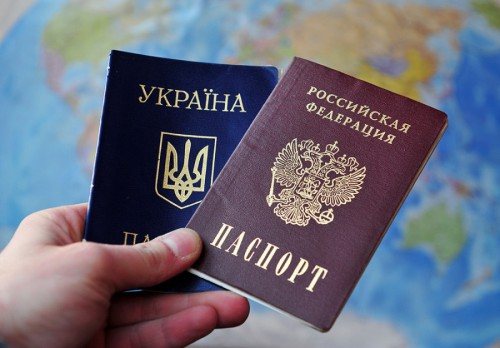
Photo: news.mail.ru
6. Obtain a refugee certificate (if the decision is made about a person who is not in Russia, he is also issued a ticket to Russia).
Upon receipt of a refugee certificate, the national (civil) passport and (or) other identification documents of the applicant recognized as a refugee remain in storage at the Federal Migration Service at the place of registration for the period of recognition of this applicant as a refugee.
To travel outside the Russian Federation and enter the Russian Federation, refugees are issued a travel document.
To work, refugees do not need to obtain a permit or patent, nor do they need to take into account quotas (in accordance with the law that came into force on May 15 this year).
Children of refugees have the right to go to kindergarten and school on the same basis as children of Russian citizens.
Refugee status does not provide for any permanent benefits from the budget, including for children. However, refugees are entitled to pensions. To do this, you need to contact the territorial body of the Pension Fund of the Russian Federation with a refugee certificate. At this time, the refugee’s other documents are already stored in the FMS; they do not need to be provided.
